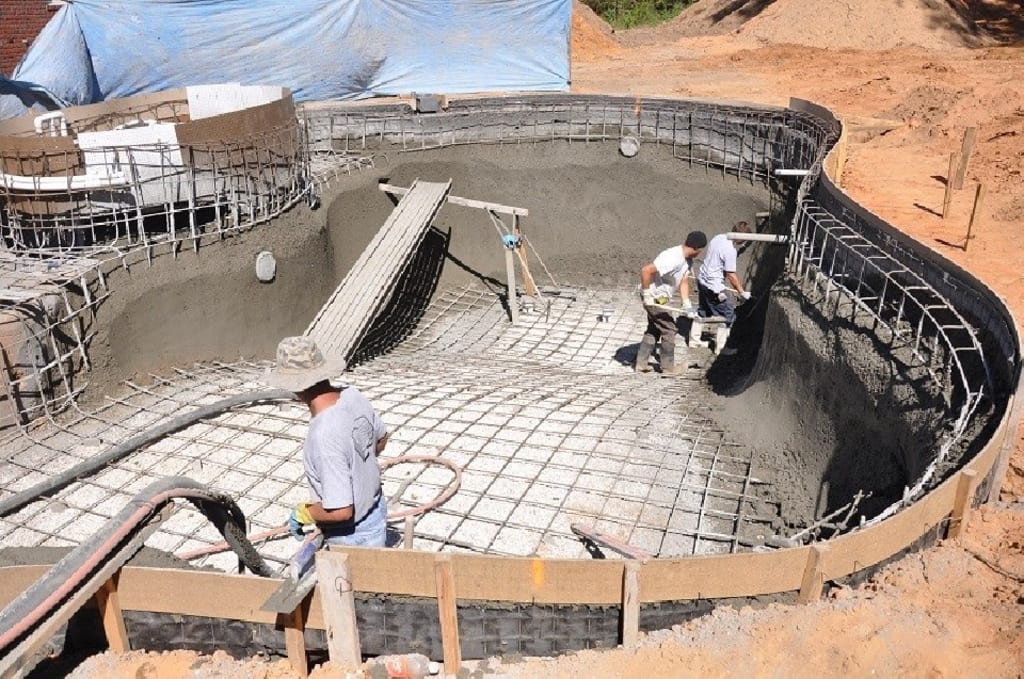Gunite vs Shotcrete Pools and Their Impact on Pool Construction
Unveiling the Differences

Building a swimming pool is an exciting endeavor, but it also comes with important decisions to make. One of the most critical choices you'll face is selecting the right construction method and materials for your pool. Gunite and shotcrete are two popular options that have revolutionized the pool construction industry. Understanding their differences and their impact on pool construction is crucial to making an informed decision. In this article, we will explore gunite and shotcrete pools, their characteristics, and their impact on pool construction.
Gunite Pools: Durability and Design Flexibility
Gunite is a mixture of cement, sand, and water that is pneumatically sprayed onto the pool's steel framework. This application method provides several benefits, starting with exceptional durability. Gunite pools are known for their longevity, with many lasting for decades. The sprayed mixture creates a solid and dense structure that can withstand the test of time. It is highly resistant to cracks, shifts in the ground, and other forms of structural damage.
One of the significant advantages of gunite pools is their design flexibility. The application process allows for intricate detailing and customization. Pool builders can shape gunite while it is being sprayed, allowing for unique shapes, curves, and custom features. Whether you want a freeform pool with naturalistic elements or a geometric design with clean lines, gunite can accommodate your vision. This flexibility opens up a world of possibilities for creating a truly personalized and visually stunning pool.
Shotcrete Pools: Strength and Stability Reinforced
Shotcrete is similar to gunite but with a slight difference in the mixing process. Shotcrete incorporates aggregate, such as small stones or gravel, into the mixture of cement, sand, and water. The addition of aggregate enhances shotcrete's strength and stability, making it an excellent choice for pools subjected to heavy usage or areas with unstable soil conditions.
Shotcrete pools excel in providing strength and stability. They can withstand high external pressures and are often preferred for commercial pools, water parks, and large-scale projects. The added aggregate reinforces the structure, ensuring its long-term durability. While shotcrete may be slightly more challenging to shape during application compared to gunite, it still offers a good level of design flexibility, especially for larger pools that require added strength.
Comparing Strength and Durability
Both gunite and shotcrete pools offer excellent strength and durability. Gunite's dense composition creates a solid structure that can withstand the test of time. It is highly resistant to cracks and structural damage, making it a reliable choice for residential pools. Shotcrete, with its added aggregate, takes durability to another level. The reinforced structure is particularly advantageous in high-pressure environments or areas with challenging soil conditions. Whether you choose gunite or shotcrete, you can have confidence in the longevity and resilience of your pool.
Construction Process and Considerations
The construction process for gunite and shotcrete pools follows a similar sequence. It begins with excavation, followed by the installation of a steel framework that will provide structural support. The key difference lies in the application method. Gunite is pneumatically sprayed onto the steel framework, while shotcrete is applied using a high-pressure hose. This distinction affects the time and effort required during construction.
Gunite construction allows for greater flexibility and adaptability during the application process. The ability to shape the material while it is being sprayed enables intricate detailing and customization. On the other hand, shotcrete may require slightly more time due to the addition of aggregate and the need for higher-pressure application. The construction timeline may vary depending on the size and complexity of the pool, as well as the expertise of the construction team.
In terms of construction considerations, it is crucial to work with experienced pool builders who specialize in gunite or shotcrete construction. Proper application techniques and attention to detail are vital to ensure the longevity and structural integrity of the pool. Hiring professionals with expertise in the chosen construction method will ensure a smooth and successful pool construction process.
Conclusion
Gunite and shotcrete pools offer unique advantages and considerations for pool construction. Gunite pools provide exceptional durability and design flexibility, allowing for the creation of personalized and visually stunning pools. Shotcrete pools, with their reinforced structure and added strength, are particularly suitable for high-pressure environments and areas with unstable soil conditions.
When deciding between gunite and shotcrete, consider your specific needs, preferences, and the intended use of the pool. Consult with experienced pool builders who can guide you based on your vision, budget, and location. By understanding the impact of gunite and shotcrete on pool construction, you can make an informed decision and embark on the journey of building the perfect pool for your enjoyment and relaxation.





Comments
There are no comments for this story
Be the first to respond and start the conversation.